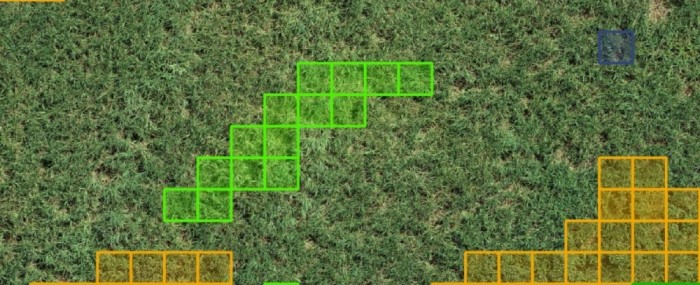
Artificial intelligence applied to drone imagery helps improve agricultural productivity
28 de novembro de 2023Por Roseli Andrion | FAPESP Innovative R&D – Growing numbers of farms with different sizes are making use of drone imaging. Drones can help detect abnormalities in crops, for example. The imagery they produce can be analyzed for changes in leaf color, moisture and other factors to determine whether a crop has been affected by a wide array of microorganisms.
Cromai, an agtech (agricultural technology) startup based in São Paulo city, Brazil, and funded by the FAPESP Innovative Research in Small Business Program (PIPE), processes drone and other aerial imagery using artificial intelligence tools to provide agronomists and farmers with a flow of data and information to support strategic decisions, reduce agrochemical use, and enhance productivity, efficiency and sustainability.
“Farmers are already quite accustomed to using drones to make images of their property,” says Guilherme Barros Castro, founder and CEO of Cromai. “The images can present information of many kinds. In the old days, aerial imagery was used for topography, but we use it for detection to make crop management more efficient.”
The firm’s name comes from croma (Portuguese for chroma, meaning color intensity or saturation), with the letters ‘ai’ standing for artificial intelligence. “We chose the name because our solution combines images and AI applied to them. Colors are highly relevant to the detections we do,” Castro explains.
The first solution developed by Cromai was designed to identify weeds in sugarcane fields. “Our AI algorithms can detect infestations, classify weeds, and produce detailed crop spraying maps in the form of files compatible with most tractors and spray drones. You simply load them into the equipment, which sprays the georeferenced locations,” he says.
In addition, weed classification by the system enables farmers to choose the right herbicide and opt for a less environmentally aggressive product. “Agrochemicals are often applied to an entire plantation in the hope of protecting it from possible infestations. The products used are generic rather than specific to targeted weeds, and dosages aren’t scientifically calculated, so some microorganisms survive,” he says.
Armed with precise data, farmers can spray only where necessary and use the correct herbicide, leading to a 65% reduction in the volume applied, according to Castro. “That’s a significant reduction,” he notes. “The financial return is substantial and immediate. The operation is far more efficient, and the farm is more sustainable.”
Savings are achieved as soon as farmers start using the software. “Our calculations show that the financial return is BRL 100 [now about USD20] per hectare, regardless of acreage,” he says, stressing that the solution can be implemented by farms of any size. “Because it’s software-driven, we can make the investment viable for large, medium and small properties alike.”
The main difference, he continues, is that large farms have their own drones whereas smaller properties often use a co-op’s. “Investment in drones is perfectly feasible for farms of all sizes nowadays. The savings from the solution assure payback in less than a month,” he says.
An additional benefit is the reduced amount of chemicals in produce when smaller amounts of chemicals are used to spray crops. “In future, parts of a typical plantation won’t have had any contact at all with chemicals. Crops will be organic even when grown on a large scale,” he says. Cromai’s data-based agriculture solution shows which parts of a large plantation have this characteristic. Only small farmers currently grow organically.
A lineage of agronomists
Castro belongs to a long line of agronomists, including his father, grandfather and great-grandfather. He graduated in mechatronic engineering, has a PhD in computer science and AI, and has studied in Japan as well as Brazil. “I’ve always been well aware of the importance of agribusiness to Brazil and the importance of Brazilian agribusiness to the world,” he says.
Cromai currently operates in ten states of Brazil and has a portfolio of five solutions. “A large proportion of this business volume was made possible by FAPESP’s support, which enabled us to invest in projects that would otherwise have taken five to ten years. These incentives are essential to the development of technologies that have a very positive impact but wouldn’t be researched without this kind of investment,” Castro says.
The firm aims to offer all the relevant information required to make farm management as efficient as possible, he explains. In addition to the solution that identifies weeds in sugarcane fields, Cromai has developed technology that detects impurities in sugarcane and will soon launch a solution to detect planting flaws.
Some of its solutions can be used on other crops, such as soybeans, for example: this offering identifies weeds and produces other layers of data. “The farmer has all the requisite data for optimal management. We aim to change the paradigm and make agriculture more precise via relevant information, so that decision-making is far more strategic and efficiency is guaranteed,” Castro says.
